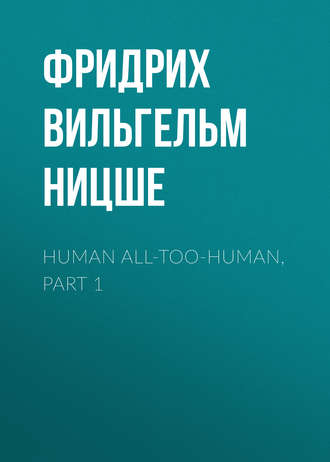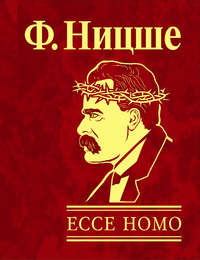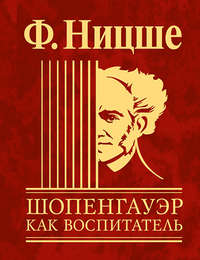 полная версия
полная версияHuman All-Too-Human, Part 1
A Delusion in Subversive Doctrines. – There are political and social dreamers who ardently and eloquently call for the overthrow of all order, in the belief that the proudest fane of beautiful humanity will then rear itself immediately, almost of its own accord. In these dangerous dreams there is still an echo of Rousseau's superstition, which believes in a marvellous primordial goodness of human nature, buried up, as it were; and lays all the blame of that burying-up on the institutions of civilisation, on society, State, and education. Unfortunately, it is well known by historical experiences that every such overthrow reawakens into new life the wildest energies, the long-buried horrors and extravagances of remotest ages; that an overthrow, therefore, may possibly be a source of strength to a deteriorated humanity, but never a regulator, architect, artist, or perfecter of human nature. It was not Voltaire's moderate nature, inclined towards regulating, purifying, and reconstructing, but Rousseau's passionate follies and half-lies that aroused the optimistic spirit of the Revolution, against which I cry, "Écrasez l'infâme!" Owing to this the Spirit of enlightenment and progressive development has been long scared away; let us see – each of us individually – if it is not possible to recall it!
464Moderation. – When perfect resoluteness in thinking and investigating, that is to say, freedom of spirit, has become a feature of character, it produces moderation of conduct; for it weakens avidity, attracts much extant energy for the furtherance of intellectual aims, and shows the semi-usefulness, or uselessness and danger, of all sudden changes.
465The Resurrection of the Spirit. – A nation usually renews its youth on a political sick-bed, and there finds again the spirit which it had gradually lost in seeking and maintaining power. Culture is indebted most of all to politically weakened periods.
466New Opinions in the Old Home. – The overthrow of opinions is not immediately followed by the overthrow of institutions; on the contrary, the new opinions dwell for a long time in the desolate and haunted house of their predecessors, and conserve it even for want of a habitation.
467Public Education. – In large States public education will always be extremely mediocre, for the same reason that in large kitchens the cooking is at best only mediocre.
468Innocent Corruption. – In all institutions into which the sharp breeze of public criticism does not penetrate an innocent corruption grows up like a fungus (for instance, in learned bodies and senates).
469Scholars As Politicians. – To scholars who become politicians the comic role is usually assigned; they have to be the good conscience of a state policy.
470The Wolf Hidden Behind the Sheep. – Almost every politician, in certain circumstances, has such need of an honest man that he breaks into the sheep-fold like a famished wolf; not, however, to devour a stolen sheep, but to hide himself behind its woolly back.
471Happy Times. – A happy age is no longer possible, because men only wish for it but do not desire to have it; and each individual, when good days come for him, learns positively to pray for disquiet and misery. The destiny of mankind is arranged for happy moments– every life has such – but not for happy times. Nevertheless, such times will continue to exist in man's imagination as "over the hills and far away," an heirloom of his earliest ancestors; for the idea of the happy age, from the earliest times to the present, has no doubt been derived from the state in which man, after violent exertions in hunting and warfare, gives himself over to repose, stretches out his limbs, and hears the wings of sleep rustle around him. It is a false conclusion when, in accordance with that old habit, man imagines that after whole periods of distress and trouble he will be able also to enjoy the state of happiness in proportionate increase and duration.
472Religion and Government. – So long as the State, or, more properly, the Government, regards itself as the appointed guardian of a number of minors, and on their account considers the question whether religion should be preserved or abolished, it is highly probable that it will always decide for the preservation thereof. For religion satisfies the nature of the individual in times of loss, destitution, terror, and distrust, in cases, therefore, where the Government feels itself incapable of doing anything directly for the mitigation of the spiritual sufferings of the individual; indeed, even in general unavoidable and next to inevitable evils (famines, financial crises, and wars) religion gives to the masses an attitude of tranquillity and confiding expectancy. Whenever the necessary or accidental deficiencies of the State Government, or the dangerous consequences of dynastic interests, strike the eyes of the intelligent and make them refractory, the unintelligent will only think they see the finger of God therein and will submit with patience to the dispensations from on high (a conception in which divine and human modes of government usually coalesce); thus internal civil peace and continuity of development will be preserved. The power, which lies in the unity of popular feeling, in the existence of the same opinions and aims for all, is protected and confirmed by religion, – the rare cases excepted in which a priesthood cannot agree with the State about the price, and therefore comes into conflict with it. As a rule the State will know how to win over the priests, because it needs their most private and secret system for educating souls, and knows how to value servants who apparently, and outwardly, represent quite other interests. Even at present no power can become "legitimate" without the assistance of the priests; a fact which Napoleon understood. Thus, absolutely paternal government and the careful preservation of religion necessarily go hand-in-hand. In this connection it must be taken for granted that the rulers and governing classes are enlightened concerning the advantages which religion affords, and consequently feel themselves to a certain extent superior to it, inasmuch as they use it as a means; thus freedom of spirit has its origin here. But how will it be when the totally different interpretation of the idea of Government, such as is taught in democratic States, begins to prevail? When one sees in it nothing but the instrument of the popular will, no "upper" in contrast to an "under," but merely a function of the sole sovereign, the people? Here also only the same attitude which the people assume towards religion can be assumed by the Government; every diffusion of enlightenment will have to find an echo even in the representatives, and the utilising and exploiting of religious impulses and consolations for State purposes will not be so easy (unless powerful party leaders occasionally exercise an influence resembling that of enlightened despotism). When, however, the State is not permitted to derive any further advantage from religion, or when people think far too variously on religious matters to allow the State to adopt a consistent and uniform procedure with respect to them, the way out of the difficulty will necessarily present itself, namely to treat religion as a private affair and leave it to the conscience and custom of each single individual. The first result of all is that religious feeling seems to be strengthened, inasmuch as hidden and suppressed impulses thereof, which the State had unintentionally or intentionally stifled, now break forth and rush to extremes; later on, however, it is found that religion is over-grown with sects, and that an abundance of dragon's teeth were sown as soon as religion was made a private affair. The spectacle of strife, and the hostile laying bare of all the weaknesses of religious confessions, admit finally of no other expedient except that every better and more talented person should make irreligiousness his private affair, a sentiment which now obtains the upper hand even in the minds of the governing classes, and, almost against their will, gives an anti-religious character to their measures. As soon as this happens, the sentiment of persons still religiously disposed, who formerly adored the State as something half sacred or wholly sacred, changes into decided hostility to the State; they lie in wait for governmental measures, seeking to hinder, thwart, and disturb as much as they can, and, by the fury of their contradiction, drive the opposing parties, the irreligious ones, into an almost fanatical enthusiasm for the State; in connection with which there is also the silently co-operating influence, that since their separation from religion the hearts of persons in these circles are conscious of a void, and seek by devotion to the State to provide themselves provisionally with a substitute for religion, a kind of stuffing for the void. After these perhaps lengthy transitional struggles, it is finally decided whether the religious parties are still strong enough to revive an old condition of things, and turn the wheel backwards: in which case enlightened despotism (perhaps less enlightened and more timorous than formerly), inevitably gets the State into its hands, – or whether the non-religious parties achieve their purpose, and, possibly through schools and education, check the increase of their opponents during several generations, and finally make them no longer possible. Then, however, their enthusiasm for the State also abates: it always becomes more obvious that along with the religious adoration which regards the State as a mystery and a supernatural institution, the reverent and pious relation to it has also been convulsed. Henceforth individuals see only that side of the State which may be useful or injurious to them, and press forward by all means to obtain an influence over it. But this rivalry soon becomes too great; men and parties change too rapidly, and throw each other down again too furiously from the mountain when they have only just succeeded in getting aloft. All the measures which such a Government carries out lack the guarantee of permanence; people then fight shy of undertakings which would require the silent growth of future decades or centuries to produce ripe fruit. Nobody henceforth feels any other obligation to a law than to submit for the moment to the power which introduced the law; people immediately set to work, however, to undermine it by a new power, a newly-formed majority. Finally – it may be confidently asserted – the distrust of all government, the insight into the useless and harassing nature of these short-winded struggles, must drive men to an entirely new resolution: to the abrogation of the conception of the State and the abolition of the contrast of "private and public." Private concerns gradually absorb the business of the State; even the toughest residue which is left over from the old work of governing (the business, for instance, which is meant to protect private persons from private persons) will at last some day be managed by private enterprise. The neglect, decline, and death of the State, the liberation of the private person (I am careful not to say the individual), are the consequences of the democratic conception of the State; that is its mission. When it has accomplished its task, – which, like everything human, involves much rationality and irrationality, – and when all relapses into the old malady have been overcome, then a new leaf in the story-book of humanity will be unrolled, on which readers will find all kinds of strange tales and perhaps also some amount of good. To repeat shortly what has been said: the interests of the tutelary Government and the interests of religion go hand-in-hand, so that when the latter begins to decay the foundations of the State are also shaken. The belief in a divine regulation of political affairs, in a mystery in the existence of the State, is of religious origin: if religion disappears, the State will inevitably lose its old veil of Isis, and will no longer arouse veneration. The sovereignty of the people, looked at closely, serves also to dispel the final fascination and superstition in the realm of these sentiments; modern democracy is the historical form of the decay of the State. The outlook which results from this certain decay is not, however, unfortunate in every respect; the wisdom and the selfishness of men are the best developed of all their qualities; when the State no longer meets the demands of these impulses, chaos will least of all result, but a still more appropriate expedient than the State will get the mastery over the State. How man organising forces have already been seen to die< out! For example, that of the gens or clan which for millennia was far mightier than the power of the family, and indeed already ruled and regulated long before the latter existed. We ourselves see the important notions of the right and might of the family, which once possessed the supremacy as far as the Roman system extended, always becoming paler and feebler. In the same way a later generation will also see the State become meaningless in certain parts of the world, – an idea which many contemporaries can hardly contemplate without alarm and horror. To labour for the propagation and realisation of this idea is, certainly, another thing; one must think very presumptuously of one's reason, and only half understand history, to set one's hand to the plough at present – when as yet no one can show us the seeds that are afterwards to be sown upon the broken soil. Let us, therefore, trust to the "wisdom and selfishness of men" that the State may yet exist a good while longer, and that the destructive attempts of over-zealous, too hasty sciolists may be in vain!
473Socialism, With Regard to Its Means. – Socialism is the fantastic younger brother of almost decrepit despotism, which it wants to succeed; its efforts are, therefore, in the deepest sense reactionary. For it desires such an amount of State power as only despotism has possessed, – indeed, it outdoes all the past, in that it aims at the complete annihilation of the individual, whom it deems an unauthorised luxury of nature, which is to be improved by it into an appropriate organ of the general community. Owing to its relationship, it always appears in proximity to excessive developments of power, like the old typical socialist, Plato, at the court of the Sicilian tyrant; it desires (and under certain circumstances furthers) the Cæsarian despotism of this century, because, as has been said, it would like to become its heir. But even this inheritance would not suffice for its objects, it requires the most submissive prostration of all citizens before the absolute State, such as has never yet been realised; and as it can no longer even count upon the old religious piety towards the State, but must rather strive involuntarily and continuously for the abolition thereof, – because it strives for the abolition of all existing States,– it can only hope for existence occasionally, here and there for short periods, by means of the extremest terrorism. It is therefore silently preparing itself for reigns of terror, and drives the word "justice" like a nail into the heads of the half-cultured masses in order to deprive them completely of their understanding (after they had already suffered seriously from the half-culture), and to provide them with a good conscience for the bad game they are to play. Socialism may serve to teach, very brutally and impressively, the danger of all accumulations of State power, and may serve so far to inspire distrust of the State itself. When its rough voice strikes up the way-cry "as much State as possible," the shout at first becomes louder than ever, – but soon the opposition cry also breaks forth, with so much greater force: "as little State as possible."
474The Development of the Mind Feared by the State. – The Greek polis was, like every organising political power, exclusive and distrustful of the growth of culture; its powerful fundamental impulse seemed almost solely to have a paralysing and obstructive effect thereon. It did not want to let any history or any becoming have a place in culture; the education laid down in the State laws was meant to be obligatory on all generations to keep them at one stage of development. Plato also, later on, did not desire it to be otherwise in his ideal State. In spite of the polis culture developed itself in this manner; indirectly to be sure, and against its will, the polis furnished assistance because the ambition of individuals therein was stimulated to the utmost, so that, having once found the path of intellectual development, they followed it to its farthest extremity. On the other hand, appeal should not be made to the panegyric of Pericles, for it is only a great optimistic dream about the alleged necessary connection between the Polis and Athenian culture; immediately before the night fell over Athens the plague and the breakdown of tradition, Thucydides makes this culture flash up once more like of the evil day that had preceded.
475European Man and the Destruction of Nationalities. – Commerce and industry, interchange of books and letters, the universality of all higher culture, the rapid changing of locality and landscape, and the present nomadic life of all who are not landowners, – these circumstances necessarily bring with them a weakening, and finally a destruction of nationalities, at least of European nationalities; so that, in consequence of perpetual crossings, there must arise out of them all a mixed race, that of the European man. At present the isolation of nations, through the rise of national enmities, consciously or unconsciously counteracts this tendency; but nevertheless the process of fusing advances slowly, in spite of those occasional counter-currents. This artificial nationalism is, however, as dangerous as was artificial Catholicism, for it is essentially an un natural condition of extremity and martial la which has been proclaimed by the few over the many, and requires artifice, lying, and force maintain its reputation. It is not the interests the many (of the peoples), as they probably say, but it is first of all the interests of certain princely dynasties, and then of certain commercial and social classes, which impel to this nationalism; once we have recognised this fact, we should just fearlessly style ourselves good Europeans and labour actively for the amalgamation of nations; in which efforts Germans may assist by virtue of their hereditary position as interpreters and intermediaries between nations. By the way, the great problem of the Jews only exists within the national States, inasmuch as their energy and higher intelligence, their intellectual and volitional capital, accumulated from generation to generation in tedious schools of suffering, must necessarily attain to universal supremacy here to an extent provocative of envy and hatred; so that the literary misconduct is becoming prevalent in almost all modern nations – and all the more so as they again set up to be national – of sacrificing the Jews as the scape-goats of all possible public and private abuses. So soon as it is no longer a question of the preservation or establishment of nations, but of the production and training of a European mixed-race of the greatest possible strength, the Jew is just as useful and desirable an ingredient as any other national remnant. Every nation, every individual, has unpleasant and even dangerous qualities, – it is cruel to require that the Jew should be an exception. Those qualities may even be dangerous and frightful in a special degree in his case; and perhaps the young Stock-Exchange Jew is in general the most repulsive invention of the human species. Nevertheless, in a general summing up, I should like to know how much must be excused in a nation which, not without blame on the part of all of us, has had the most mournful history of all nations, and to which we owe the most loving of men (Christ), the most upright of sages (Spinoza), the mightiest book, and the most effective moral law in the world? Moreover, in the darkest times of the Middle Ages, when Asiatic clouds had gathered darkly over Europe, it was Jewish free-thinkers, scholars, and physicians who upheld the banner of enlightenment and of intellectual independence under the severest personal sufferings, and defended Europe against Asia; we owe it not least to their efforts that a more natural, more reasonable, at all events un-mythical, explanation of the world was finally able to get the upper hand once more, and that the link of culture which now unites us with the enlightenment of Greco-Roman antiquity has remained unbroken. If Christianity has done everything to orientalise the Occident, Judaism has assisted essentially in occidentalising it anew; which, in a certain sense, is equivalent to making Europe's mission and history a continuation of that of Greece.
476Apparent Superiority of the Middle Ages. – The Middle Ages present in the Church an institution with an absolutely universal aim, involving the whole of humanity, – an aim, moreover, which – presumedly – concerned man's highest interests; in comparison therewith the aims of the States and nations which modern history exhibits make a painful impression; they seem petty, base, material, and restricted in extent. But this different impression on our imagination should certainly not determine our judgment; for that universal institution corresponded to feigned and fictitiously fostered needs, such as the need of salvation, which, wherever they did not already exist, it had first of all to create: the, new institutions, however, relieve actual distresses; and the time is coming when institutions will arise to minister to the common, genuine needs of all men, and to cast that fantastic prototype, the Catholic Church, into shade and oblivion.
477War Indispensable. – It is nothing but fanaticism and beautiful soulism to expect very much (or even, much only) from humanity when it has forgotten how to wage war. For the present we know of no other means whereby the rough energy of the camp, the deep impersonal hatred, the cold-bloodedness of murder with a good conscience, the general ardour of the system in the destruction of the enemy, the proud indifference to great losses, to one's own existence and that of one's friends, the hollow, earthquake-like convulsion of the soul, can be as forcibly and certainly communicated to enervated nations as is done by every great war: owing to the brooks and streams that here break forth, which, certainly, sweep stones and rubbish of all sorts along with them and destroy the meadows of delicate cultures, the mechanism in the workshops of the mind is afterwards, in favourable circumstances, rotated by new power. Culture can by no means dispense with passions, vices, and malignities. When the Romans, after having become Imperial, had grown rather tired of war, they attempted to gain new strength by beast-baitings, gladiatoral combats, and Christian persecutions. The English of to-day, who appear on the whole to have also renounced war, adopt other means in order to generate anew those vanishing forces; namely, the dangerous exploring expeditions, sea voyages and mountaineerings, nominally undertaken for scientific purposes, but in reality to bring home surplus strength from adventures and dangers of all kinds. Many other such substitutes for war will be discovered, but perhaps precisely thereby it will become more and more obvious that such a highly cultivated and therefore necessarily enfeebled humanity as that of modern Europe not only needs wars, but the greatest and most terrible wars, – consequently occasional relapses into barbarism, – lest, by the means of culture, it should lose its culture and its very existence.
478Industry in the South and the North. – Industry arises in two entirely different ways. The artisans of the South are not industrious because of acquisitiveness but because of the constant needs of others. The smith is industrious because some one is always coming who wants a horse shod or a carriage mended. If nobody came he would loiter about in the market-place. In a fruitful land he has little trouble in supporting himself, for that purpose he requires only a very small amount of work, certainly no industry; eventually he would beg and be contented. The industry of English workmen, on the contrary, has acquisitiveness behind it; it is conscious of itself and its aims; with property it wants power, and with power the greatest possible liberty and individual distinction.









